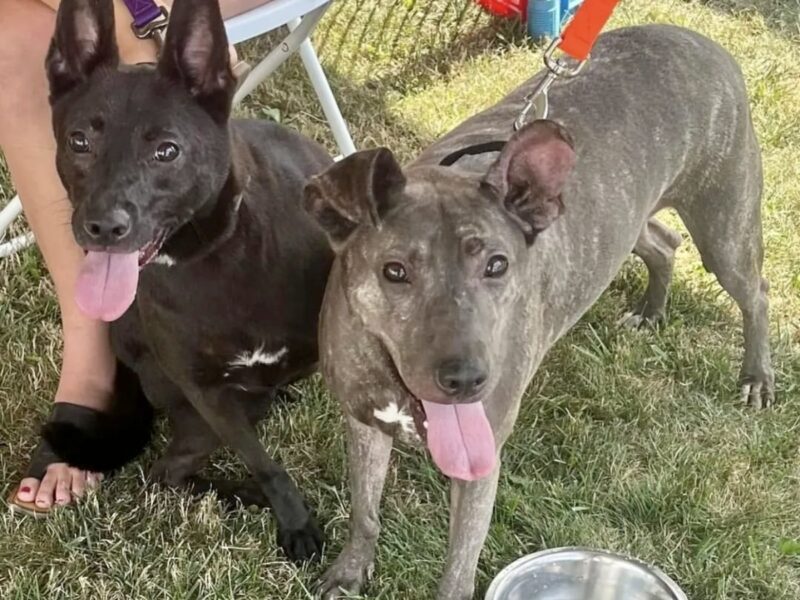

I am not a dog person. I am, however, a person with a dog. Or rather, my son’s dog.
When we started fostering our rescue dog, Major, he seemed to know as little about being a dog as I knew about being an owner. He didn’t bark. Or wag his tail. He didn’t even like treats. I’d throw a ball and he’d look at me like, “What did you do that for?”
One thing I do know is that if we’re going to adopt him, I want to keep his carbon paw print to a minimum.
Dogs throughout my childhood, and most of human history, were these semi-feral creatures who helped us dispose of table scraps. Today’s canines play with “enrichment” dog toys, wear reindeer antlers at Christmas, and chase glow in the dark, talking balls. “Pet tech” products are now their own $16 million industry.
Dogs living this new dolce vita emit 1,700 pounds of greenhouse gases per year in the U.S. For the bigger barker, this figure goes up to 5,500 pounds, about the same carbon footprint as an SUV.
According to a United Nations IPCC (Intergovernmental Panel on Climate Change) report, we only have nine years — 57 dog years — left to reduce greenhouse gas emissions by half, if we are to avoid the worst damages from climate change.
The biggest eco-mistake pet owners make is thinking that dogs are people. The more we treat them like our children (aka “fur babies”), the more they contribute to climate change.
Let’s start by skipping the human-grade beef. Dogs eat a higher percentage of meat in their diet than even the most carnivorous of pet owners, “accounting for 25 percent of all the land, water, fossil fuel, fertilizer and pesticide use associated with producing that meat,” says Gregory Orkin, of The Institute of Environment and Sustainability. “If our four-legged friends were a country, it would rank fifth in global meat consumption,” adds Orkin.
Don’t mistake your dog for wolf. While cats are considered “obligate carnivores,” dogs are omnivore. They can thrive on a vegetarian diet.
“Dogs are fine with a vegetarian diet as long as it’s balanced with quality ingredients,” says Dr. Turetsky of The Veterinary Clinic in East Hampton. “They can get all the nutrients and proteins they need from vegetables.”
Not ready to give up meat completely? Dogs are also “flexitarian” and benefit from a nutritionally varied diet. Try Meatless Mondays, opting for fish, chicken, or insect-based food. Even if beef consumption is cut by half, that’s still a lot of land, water and fossil fuel saved.
Consider crickets. Tiny crickets use a tiny fraction of the resources consumed to rear farm animals, and produce a fraction of the greenhouse gases emitted in traditional beef and poultry farming. Putting bug-based dog food on the menu adds a nutritious source of protein, creating good gut health and an enhanced immune system.
If dining on critters strikes you as just plain weird, picture the way some dogs like to jump up midair and catch “sky raisins,” otherwise known as flies. In the wild, 25 percent of a dog’s diet is bugs.
If you do stick to meat, leave the human-grade cuts for humans, and feed dogs actual dog food. Dogs are not gourmands. They do not need freeze dried goat and wild boar. They do not prefer white meat to dark, or any form of “premium,” human-grade dog food.
“The trend to feed premium quality ingredients goes back to our habit of viewing our pets’ needs through the lens of what we would like, rather than what they actually need or like,” explains Angela Frimberger, a veterinarian with Vets for Climate Action.
So let’s recognize dogs as the four legged composters that they want to be. Dogs are just as happy to eat organs and other meat by-products that humans typically discard, whose nutritional value is high and can be dense in the kind of nutrients that’s good for dogs. Environmentally, traditional dog food that uses meat by-products (the parts of meat that humans don’t consume), means very little of the animal is wasted.
Try not to overfeed your dog. Puppy-dog eyes are hard to ignore, but that extra scoop of kibble or constantly doling out treats harms them and wastes resources. Almost 19 percent of dogs in the United States are considered to be obese, which is linked to a host of serious health issues. Ask your vet how many calories they need according to their size and physical activity.
Stick to dry food. Wet food contributes up to seven times more carbon emissions than a diet of dry kibble.
“Whether it’s cricket chow today, or cultivated mouse in the near future, the key to a climate-friendly pet diet is making sure it stays in kibble form,” wrote Aryn Baker in a recent article about the climate paw print of pet ownership.
Poop is an environmental conundrum. Scooping it up and flushing it down the toilet is the most eco-friendly way to dispose of it, but even the doggiest of dog people say that’s just not going to happen. Composting is a another great solution, and hats off to those brave souls who set up a separate composting pile, follow very specific safety guidelines and then remember not to put the compost on edible plants.
For us less intrepid folks, even biodegradable poop bags are problematic. They’re designed to break down under specific conditions, one of which is not in a landfill. When buried in a landfill, they degrade slowly and create methane, a powerful greenhouse gas. Reusing plastic bags from newspapers and junk mail is at least recycling. And buying compostable bags is better than biodegradable because they decompose within a couple of months, rather than a couple of centuries.
Over all, the best way to do the doody right, is to chuck it into the woods. Far into the woods. Despite concerns, most climate experts agree that there isn’t enough poop for the nitrogen it creates to impact our waterways.
It’s always better for the environment to adopt. Starting with Hurricane Katrina, “Adopt, Don’t Shop” became a movement. When you adopt from a shelter, rather than buy from a breeder or pet store, it helps combat overpopulation.
There’s an irony to rescuing a dog from the ravages of places like the deep South. When Hamptons dogs eat human grade red meat and buy stuff they don’t need, they create a huge carbon paw print. This then contributes to climate change, which in turn, causes hurricanes and flooding that force people to flee their homes and surrender their dogs, often to the very people who helped create this mess.
As with us homo sapiens, dogs living the high life today, will make life much harder for puppies in the future. Global warming is already taking a toll on dogs.
“We’ve seen higher numbers dying from heatstroke in the recent heat waves last summer,” says Lizzy Rosenburg of Green Matters. “And sadly, flat-nosed dogs, such as bulldogs, pugs and boxers, struggle the most.”
Major, for his part, has been growing into his dogginess nicely. His days of flinching every time a bird chirps and hating the great outdoors are behind him. Our dog walks are finally more walk than drag. The other day at a dog park, someone even called him “friendly.”
As a dog person in training, I believe that Major and all his canine friends deserve a habitable planet for many dog years to come.
Jiminy’s Dog Food (jiminys.com): Kibble that combines high quality insect proteins with plant-based ingredients. Cricket Treats are good for gut health. Great Grub enhances the immune system. Variety of six different treats, two kibbles and two wet foods all available at Petco in Bridgehampton.
Karma Pet Foods: Plant-based dog food — zero-waste, non-GMO, with 60 percent plant proteins and superfoods, supplemented with fish and chicken. Made by the food giant Mars of all things.
Animal Rescue Center of the Hamptons (ARF): The go-to place for adopting and fostering cats and dogs. Offers everything from wellness classes to a dog food pantry to the Bow Wow Meow Ball in August.
Tylers Rescue Inc. (tylersrescue.com): Volunteer to foster, adopt or just spend time playing with dogs who need a little extra TLC. And if you need help caring for your dog, they’re a good source.
“Free Puppies!” (Documentary): Meet the “rescue ladies” who travel the rural south to get mama dogs spayed and puppies on a road trip up north to new homes. Heartbreaking, yet so much cuteness packed into just over an hour.
 More Posts from Jenny Noble
More Posts from Jenny Noble